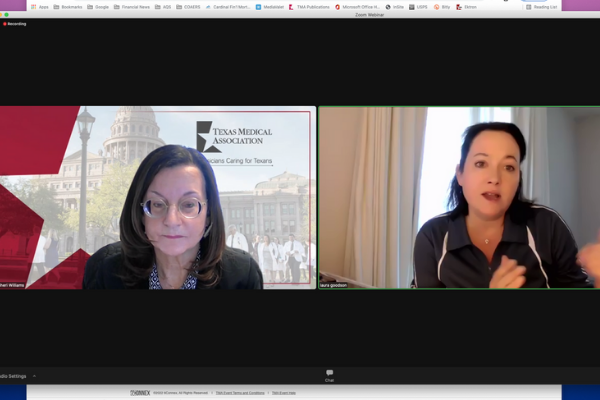
Physician employers may feel caught between a rock and a hard place while trying to navigate employee vaccination policies. Federal emergency regulations continue to face court challenges, and Texas Gov. Greg Abbott issued an executive order in October 2021 that contradicts federal guidelines.
“We all have whiplash right now,” said Laura Goodson, a labor and employment attorney at the Austin law firm DeShazo & Nesbitt, during the latest Texas Medical Association Ask the Expert live event.
But physician employers can avoid legal fallout related to COVID-19 vaccines by establishing an exemption request process and by establishing accommodations for those who qualify. This was the take-home message from the event, which took place during TMA’s virtual 2022 Winter Conference on Jan. 29.
Ms. Goodson focused on the emergency regulation issued by the Centers for Medicare & Medicaid Services (CMS) on Nov. 4 and recently upheld by the U.S. Supreme Court. The rule does not apply to independent physician practice settings but does affect staff – including physician contractors and those with admitting privileges – at hospitals, nursing homes, federally qualified health centers, and
other health care facilities.
Texas facilities subject to the CMS regulation must establish policies to ensure staff are vaccinated, provide exemptions, and track staff exemptions by Feb. 22, according to CMS. Under federal law, exemptions are only allowed due to sincerely held religious beliefs or out of medical necessity. Although Gov. Abbott’s executive order expands this category to include “reasons of personal conscience,” Ms. Goodson says federal law trumps state law under the U.S. Constitution.
Although employers may require a written statement from employees to discern the basis of their exemption request, Ms. Goodson encourages them to err on the side of granting exemptions. “Employers should not be in the business of disputing whether someone’s religious belief is valid or not,” she said. “If you do have concerns about that, you should seek legal counsel.”
In the case of exemptions, employers must consider a range of possible, reasonable accommodations, such as shifting the employee to remote work or changing his or her job duties to limit the employee’s interactions with the public.
If an employee refuses to follow the accommodation, or an accommodation isn’t possible, Ms. Goodson encourages employers to document the issue and seek legal counsel before deciding to terminate the employee. The Texas Workforce Commission has established a hotline for employees to report job losses due to a workplace vaccine mandate.
Employers may also be concerned about the impact of the CMS rule on recruiting, especially given widespread staffing shortages across the health care industry. Ms. Goodson says the same rules apply to prospective employees.
“It’s perfectly fine to have a mandatory vaccination policy,” she explained, “but you still must consider candidates who indicate they might seek an exemption.”
TMA members who joined the live general session, which included this Ask the Expert event, are eligible for up to 2.5 AMA PRA Category 1 Credits™ and can report their attendance using the TexMed portal.
Check out TMA’s Ask the Expert webpage to find more resources on this topic and to register for upcoming live events, including Managing Your Online Reputation during the TexMed annual conference in April.
Emma Freer
Associate Editor
(512) 370-1383